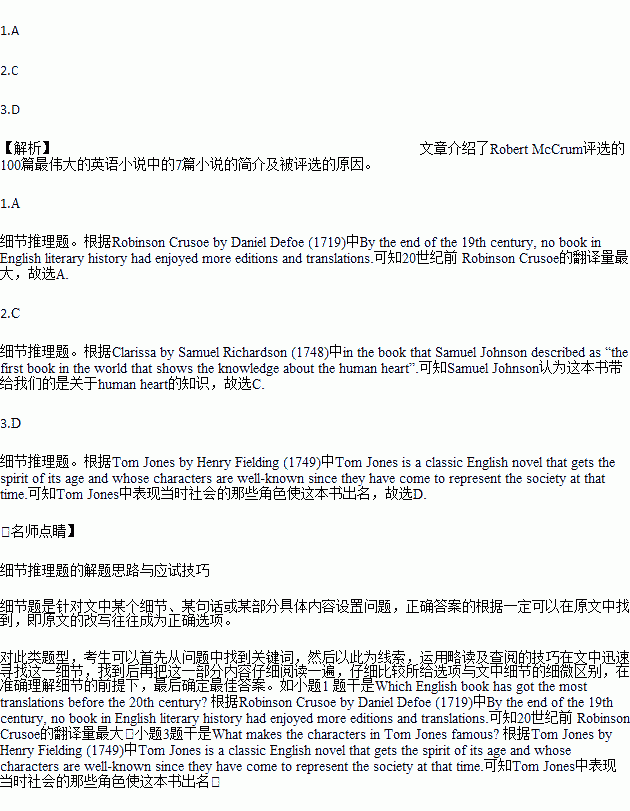题目内容
After two years of careful consideration, Robert McCrum has reached a conclusion on his selection of the 100 greatest novels written in English. Take a look at a few in his list:
The Pilgrim’s Progress by John Banyan (1678)
A story of a man in search of truth told with the simple clarity and beauty of Bunyan’s prose makes this an English classic.
Robinson Crusoe by Daniel Defoe (1719)
By the end of the 19th century, no book in English literary history had enjoyed more editions and translations. This world-famous novel is a complex literature that one cannot resist.
Gulliver’s Travels by Jonathan Swift (1726)
A great work that’s been repeatedly printed, Jonathan Swift’s Gulliver’s Travels comes third in our list of the best novels written in English.
Clarissa by Samuel Richardson (1748)
Clarissa is a tragic heroine, pressured by her dishonorable family to marry a wealthy man she dislikes, in the book that Samuel Johnson described as “the first book in the world that shows the knowledge about the human heart”.
Tom Jones by Henry Fielding (1749)
Tom Jones is a classic English novel that gets the spirit of its age and whose characters are well-known since they have come to represent the society at that time.
Emma by Jane Austen (1816)
Jane Austen’s Emma is her most outstanding work, mixing the best parts of her early books with a deep sense of feelings.
The Narrative of Arthur Gordon Pym of Nantucket by Edgar Allan Poe (1838)
Edgar Allan Poe’s only novel—a classic adventure story with supernatural elements—has fascinated and influenced generations of writers.
1.Which English book has got the most translations before the 20th century?
A. Robinson Crusoe. B. Gulliver’s Travels.
C. Tom Jones. D. Emma.
2.What does Samuel Johnson think we can learn about from the book Clarissa?
A. A love story. B. Quarrels in a family.
C. The human heart. D. The spirits of the lime.
3.What makes the characters in Tom Jones famous?
A. Their classic lifestyles.
B. Their different nationalities.
C. Their typical spirits of the age.
D. Their representation of the society.
 天天向上一本好卷系列答案
天天向上一本好卷系列答案 小学生10分钟应用题系列答案
小学生10分钟应用题系列答案
